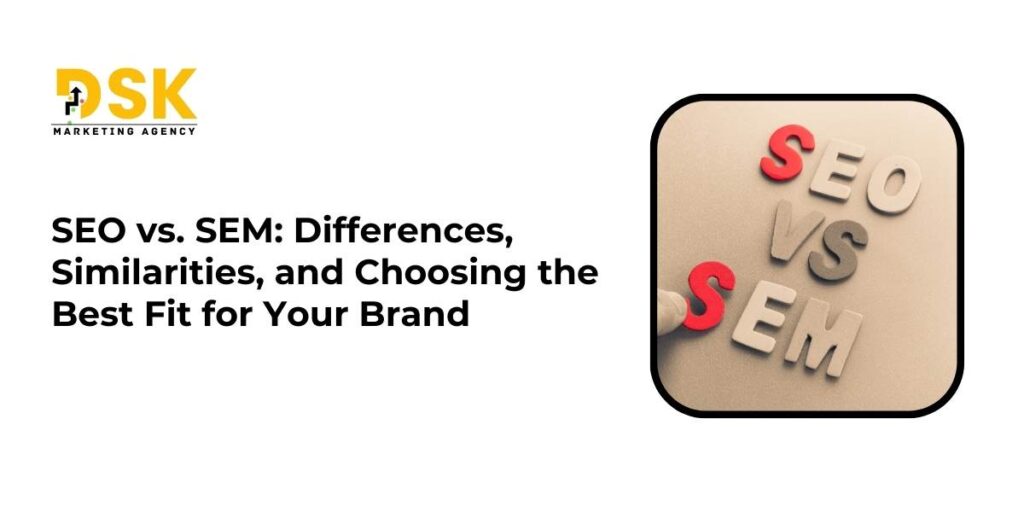
In the ever-evolving world of digital marketing, two terms stand out prominently: SEO and SEM. Both are crucial components of any successful online strategy, but understanding their nuances can make all the difference in achieving your marketing goals. In this comprehensive guide, we’ll delve into the distinctions, parallels, and help you determine the optimal choice for your brand’s success.
SEO and SEM Defined:
Search Engine Optimization (SEO) involves optimizing your website and content to rank higher in organic search engine results. It focuses on enhancing visibility through techniques such as keyword optimization, content creation, and improving website structure.
On the other hand, Search Engine Marketing (SEM) encompasses paid advertising strategies to increase visibility in search engine results pages (SERPs). It includes pay-per-click (PPC) advertising, display ads, and remarketing campaigns aimed at driving immediate traffic and conversions.
Differences Between SEO and SEM:
- Cost:
- SEO: Generally, SEO requires upfront investment in time and resources to optimize your website and content. While it may take time to see significant results, the long-term benefits often outweigh the initial costs.
- SEM: SEM involves direct costs, as you pay for each click on your ads. The cost can vary based on factors like competition, keywords, and targeting options.
- Visibility:
- SEO: Achieving a high ranking in organic search results increases visibility and credibility, as users tend to trust organic listings more than paid ads.
- SEM: With SEM, you can instantly appear at the top of search results, providing immediate visibility to your target audience. However, this visibility diminishes once you stop paying for ads.
- Time Frame:
- SEO: SEO is a long-term strategy that requires patience and ongoing efforts to maintain and improve rankings. It may take several months to see significant results, but the benefits can be sustainable over time.
- SEM: SEM delivers quick results, making it ideal for short-term campaigns or promoting time-sensitive offers. You can launch ads and start driving traffic almost instantly.
- Click Intent:
- SEO: Organic search traffic often consists of users actively seeking information, products, or services related to their query. This means higher intent and potential for conversion.
- SEM: While SEM can attract high-intent users, it also captures users at various stages of the buying cycle, including those in the research phase.
Similarities Between SEO and SEM:
- Keyword Research:
- Both SEO and SEM rely on keyword research to understand user intent and target relevant search terms. Identifying the right keywords is crucial for optimizing content and ad campaigns.
- Content Quality:
- Quality content is essential for both SEO and SEM success. Engaging, informative content not only improves organic rankings but also enhances ad relevance and click-through rates.
- Analytics and Optimization:
- Both strategies require monitoring and analysis to track performance and make data-driven decisions. Whether it’s adjusting keywords, optimizing landing pages, or refining ad copy, continuous optimization is key to success.
- User Experience:
- Providing a positive user experience is vital for SEO and SEM effectiveness. Factors such as site speed, mobile-friendliness, and intuitive navigation contribute to higher rankings and better ad performance.
Choosing the Best Strategy for Your Brand:
- Consider Your Goals:
- Determine whether your primary objective is to increase brand awareness, drive website traffic, or generate leads and sales. SEO is ideal for long-term brand building and sustainable growth, while SEM offers immediate visibility and results.
- Assess Your Budget and Timeline:
- Evaluate your budget constraints and timeline for achieving results. If you have limited resources and need quick wins, SEM may be the way to go. However, if you can afford to invest in a long-term strategy, SEO can deliver lasting benefits.
- Evaluate Competition and Industry Dynamics:
- Analyze your competitive landscape and industry trends to understand where SEO and SEM can offer the most significant advantages. In highly competitive markets, a combination of both strategies may be necessary to gain a competitive edge.
- Consult with Experts:
- Consider partnering with a reputable digital marketing agency in Mumbai, to develop a customized strategy tailored to your brand’s unique needs and objectives. A knowledgeable agency can provide valuable insights and recommendations based on industry best practices and data-driven analysis.
In conclusion, SEO and SEM are complementary yet distinct strategies that play integral roles in the digital marketing landscape. By understanding their differences, similarities, and considering your brand’s goals and resources, you can make an informed decision on the best approach to maximize your online visibility and drive business growth.
Remember, the best digital marketing company in Mumbai will not only help you navigate the complexities of SEO and SEM but also develop a holistic digital marketing strategy that aligns with your brand objectives and delivers measurable results.
